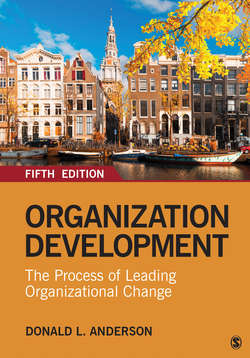Читать книгу Organization Development - Donald L. Anderson - Страница 50
На сайте Литреса книга снята с продажи.
Core Values of Organization Development
ОглавлениеSeveral humanistic assumptions underlie the core values of the field. By humanistic we mean that individuals deserve respect, are trustworthy, and want to achieve personal growth and satisfaction (Wooten & White, 1999). Humanistic values also include a belief in the equity and equality of people, democratic principles, and a belief in human dignity and worth. “Broadly defined, this humanistic orientation can be summed up as ‘improving organizational life for all members’” (Church et al., 1992, p. 11). Adapting from predecessors Likert, MacGregor, and Blake and Mouton, Tannenbaum and Davis (1969) articulated the transition in values taking hold in organizations at the time. Table 3.1 summarizes the alternative values espoused by OD practitioners.
Expanding on the definitions listed on the right side of Table 3.1, Margulies and Raia (1972) were among early proponents of OD’s humanistic values, which they described as follows:
1 Providing opportunities for people to function as human beings rather than as resources in the productive process.
2 Providing opportunities for each organization member, as well as for the organization itself, to develop to his [or her] full potential.
3 Seeking to increase the effectiveness of the organization in terms of all of its goals.
4 Attempting to create an environment in which it is possible to find exciting and challenging work.
5 Providing opportunities for people in organizations to influence the way in which they relate to work, the organization, and the environment.
6 Treating each human being as a person with a complex set of needs, all of which are important in his [or her] work and in his [or her] life. (p. 3)
Table 3.1
Source: Tannenbaum, R., & Davis, S. A. (1969). Values, man, and organizations. Industrial Management Review, 10(2), 67–86.
© 1969 from MIT Sloan Management Review/Massachusetts Institute of Technology.
Many who read this list of humanistic values for the first time have an initial feeling that they are worthy values to hold, but they see them as too idealistic to implement in practice, specifically in a competitive organizational environment in which business results are necessary. The OD practitioner sees the possibilities for an improved organizational life in which personal and organizational goals are not at odds. This means, perhaps most fundamentally to OD’s values, that personal effectiveness, challenge, learning, fulfillment, and satisfaction can be gained at the same time that the organization’s effectiveness and objectives are also realized. We will return to this point later in the chapter.
In the next sections we will examine several of OD’s current values in more detail, summarized in Table 3.2.
